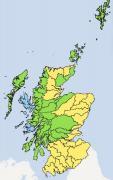SEPA seeks views on radioactive waste disposal guidance
18th May 2008
The principles and requirements for near-surface disposal facilities dealing with radioactive waste have been set down in a new guidance document being consulted on by the Scottish Environment Protection Agency (SEPA).
As Scotland's environmental regulator, SEPA is responsible for ensuring that people and the environment are protected both now and in the future. The improved guidance is intended to help deliver safe and sustainable management of radioactive wastes suitable for near-surface disposal, both during operation of disposal facilities and long after they have been closed.
SEPA's George Hunter said: "The guidance sets down the principles and requirements that we expect any near-surface disposal facility for radioactive waste to comply with. I would urge anyone with an interest in this area to send us their views.
"We want to achieve a clear understanding of the principles and requirements that developers or operators of near-surface radioactive waste disposal facilities need to meet before we can grant an authorisation for radioactive waste disposal. We believe the document sets out high environmental standards to ensure protection of people and the environment, both now and in the future."
SEPA is encouraging anyone with an interest in radioactive waste and the environment to read the document and feed back their support and concerns to the organisation. Full details of the proposals are available at www.sepa.org.uk/consultation/current/radioactive_waste/index.htm
Comments canbe made to SEPA by emailing NearSurfaceGRA[AT]sepa.org.uk by Monday 1 September.
Following this consultation and a review of the feedback received, the final guidance should be published in late 2008.
SEPA has worked with the Environment Agency in England and Wales and the Environment and Heritage Service in Northern Ireland to produce the guidance.
Related Businesses
Related Articles
Water scarcity report from SEPA
The river catchments of the Nith, Dee (Galloway), Cree, Doon, Irvine and Ayr and the Clyde have been raised to Alert. The river catchments of the Shin, Naver, Conon, Spey, Deveron, Ythan, Don (Aberdeenshire), Dee (Aberdeenshire), Esk, Firth of Tay, Firth of Forth, Almond, Tyne (Lothian), Tweed, Esk (Dumfriesshire), Annan and Thurso remain at Alert.
Working together for the North Highland water environment
Protecting and enhancing the natural waters of the North Highland area is a huge task involving many organisations and communities, and Scotland's environment watchdog is urging all those with an interest to get involved. The Scottish Environment Protection Agency (SEPA) is asking interested local communities and businesses to read the draft River basin management plans (RBMP) and Local area management plans (AMP) and feed back whether they think the plans are comprehensive enough, how they can help to achieve the aims of the plans, and how we can all work together to achieve them.New environmental regulations needn't be costly
In the current economic climate it is essential businesses are prepared for new regulations, as failure to comply could lead to increased costs. NetRegs (www.netregs.gov.uk) is a free UK website offering environmental guidance for businesses and is delivered in partnership with the Scottish Environment Protection Agency (SEPA).Scotland's recycling rate continues to rise
Scotland's recycling and composting rate continues to make steady progress. Figures released today (Friday 13 February), by the Scottish Environment Protection Agency (SEPA), show that Scotland's annual recycling and composting rate rose to 32.9% for the year October 2007 to September 2008.New approach to improving the future health of Scotland's water
Scotland's environment watchdog has found that 57% of Scotland's water is in good condition, or better. This provides an excellent basis for our future livelihoods, economy and recreation.NORTH-EAST FARMER FINED FOR RIVER POLLUTION
A north-east farmer was fined �2000 for allowing diesel to enter surface water drains and into a tributary of the River Ythan causing pollution of the river. Mr Roger Glennie from the Hillhead of Ardo Farm, Methlick, Ellon pled guilty today (21 January 2009) to a contravention of legislation designed to protect the water environment.SEPA cuts red tape in waste regulations
The Scottish Environment Protection Agency (SEPA) has announced further steps to reduce bureaucracy, while still ensuring high levels of environmental protection. Changes have been put in place to how SEPA enforces three sets of regulations; the Producer Responsibility (Packaging Waste) Regulations, the Waste Electrical and Electronic Equipment Regulations (WEEE) and the Trans Frontier Shipment Regulations (TFS).Climate Change Plan for SEPA published
With the Climate Change Scotland Bill now in parliament, it is important that everyone starts thinking how they will contribute to the ambitious world leading targets set out in the Bill. As Scotland's environment watchdog, the Scottish Environment Protection Agency (SEPA) has a key role in addressing climate change and has today (19 December) published its climate change plan for SEPA.SEPA reveals 10-point plan to support economic activity
The Scottish Environment Protection Agency (SEPA) has developed, with Government, a 10-point Plan to support economic activity during the current difficulties. The aim is to help the economy whilst also protecting the environment and the health and well being of communities across Scotland.SEPA urges everyone to have a safe and happy Bonfire Night
Now that the evenings are getting darker, and colder, many people are starting to think about Autumnal celebrations like Hallowe'en and Bonfire Night. While huddling round a blazing bonfire is an important part of the celebrations, and a good way to keep warm, the Scottish Environment Protection Agency (SEPA) is reminding everyone that careful consideration needs to be given to what goes on any pyres.
